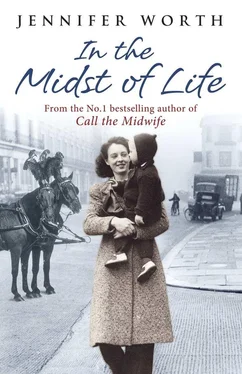Jennifer Worth - In the Midst of Life
Здесь есть возможность читать онлайн «Jennifer Worth - In the Midst of Life» весь текст электронной книги совершенно бесплатно (целиком полную версию без сокращений). В некоторых случаях можно слушать аудио, скачать через торрент в формате fb2 и присутствует краткое содержание. Жанр: Биографии и Мемуары, на английском языке. Описание произведения, (предисловие) а так же отзывы посетителей доступны на портале библиотеки ЛибКат.
- Название:In the Midst of Life
- Автор:
- Жанр:
- Год:неизвестен
- ISBN:нет данных
- Рейтинг книги:3 / 5. Голосов: 1
-
Избранное:Добавить в избранное
- Отзывы:
-
Ваша оценка:
- 60
- 1
- 2
- 3
- 4
- 5
In the Midst of Life: краткое содержание, описание и аннотация
Предлагаем к чтению аннотацию, описание, краткое содержание или предисловие (зависит от того, что написал сам автор книги «In the Midst of Life»). Если вы не нашли необходимую информацию о книге — напишите в комментариях, мы постараемся отыскать её.
In the Midst of Life — читать онлайн бесплатно полную книгу (весь текст) целиком
Ниже представлен текст книги, разбитый по страницам. Система сохранения места последней прочитанной страницы, позволяет с удобством читать онлайн бесплатно книгу «In the Midst of Life», без необходимости каждый раз заново искать на чём Вы остановились. Поставьте закладку, и сможете в любой момент перейти на страницу, на которой закончили чтение.
Интервал:
Закладка:
Mr Roberts was admitted to the Marie Curie Hospital suffering from prostate cancer, which had been treated by prostatectomy in the Royal Free Hospital. He had come to us for radium treatment but the widespread metastasis in the bones was clear evidence that the treatment had come too late.
When I was a young girl, I was told that men who had difficulty urinating carried a catheter coiled in their hatbands. When they needed to pass water, they catheterised themselves. At first, they would inevitably develop an infection, but the body’s immune system is built to fight that, and once these men had got over the initial bouts of infection, the body became immune to the germs lurking in the hatband.
Testing for cancer was not routine. Some men went to a doctor, but the treatment was fairly rudimentary – diuretics, potassium citrate, no alcohol, barley water – none of which was effective. Later, in the 1940s, the female hormones oestrogen and progesterone were prescribed in the hope of reducing the enlargement, but it is doubtful if these treatments did much good. Consequently, a great many men developed such massively distended bladders, filled with retained urine, impossible to pass normally or by catheter, that abdominal entry was necessary and a supra-pubic catheter had to be inserted to drain the fluid. I was in theatre once as the ‘runner’ - the lowliest member of the team - when a man was wheeled in with a massive lump in his lower abdomen; it was his bladder. He had not been able to pass urine for weeks. It was impossible, even under anaesthetic, to get a catheter past the enlarged prostate, so a supra-pubic insertion was made and more than a gallon of urine was drained off. The man died from surgical shock.
That was an extreme case, and the worst I have seen, but a great many men had to endure weeks in bed with indwelling catheters, twenty-four-hour drainage, daily bladder irrigation, uraemia, antiseptics and antibiotics before a prostatectomy could be attempted. Sometimes I felt that the catheter in the hatband would have been the better option.
This was all embarrassing and unpleasant for a sensitive man because there were very few male nurses in the profession; so young girls almost always performed such tasks. Incidentally, nursing procedures were comparatively basic. The following is taken from Wilson Harlow’s Modern Surgery for Nurses (1956):
There are various means of retaining an indwelling catheter in the male urethra. A common method is to attach four pipe cleaners, or two pieces of tape, to the catheter. The ends, which should be 4—6 inches long, are then brought up and fixed to the penis by a piece of Elastoplast or bandage. A similar retainer can be constructed out of a piece of sheet rubber fitted with holes and collar studs to fasten it to the penis and catheter.
I do not know what humiliations Mr Roberts had been subjected to before or after the prostatectomy, but when he came into the Marie Curie, the cancer was widespread, and there was no hope of cure. Nonetheless, the Chief decided on six doses of radiotherapy to try to control the spread, and eight if the results were favourable.
Mr Roberts’ wife and two of their eldest sons came with him. She was an unexceptional woman, apart from two trusting brown eyes that forced the word ‘integrity’ into your heart. She said that they would prefer to look after her husband at home, but they had only one room and had to climb sixty-four stairs to reach it. The Chief said that we would look after him well, and that they could visit any time, day or night. Doctors, I have found, make these rash comments without the slightest thought to the practicalities involved!
Mr Roberts said, ‘My days are numbered, so I thank you, kind doctor. My family will continue my life that is running away from me.’ He squeezed his wife’s hand and said ‘The Lord giveth and the Lord taketh away. Blessed be the name of the Lord.’ His wife whispered, ‘Blessed be God in his wisdom.’ The two boys said ‘Hallelujah’ and then one of them let out a howl. His mother said: ‘Abraham, you stop your noise right now. The good sister no want your noise in her nice quiet ward, you hear me?’ From such a small woman the effect was surprising and instantaneous.
The Chief smiled and left, saying, ‘I leave it in your capable hands, Sister.’ The wife left also, as the two youngest girls were due home from school, but the two young men said they were doing the night shift at a nearby warehouse, and could stay. As it was close to visiting hour, I agreed.
In those days, visiting hours were very strict. Too strict, I felt, but hospital discipline had to be maintained. I was glad to relax the rules when I could, but the Chief’s comment about unlimited visiting day or night was going a bit too far. Three o’clock came, and the visitors who had gathered outside were admitted. One or two wanted to see me, but mostly I was left in peace to check the drugs and equipment and to complete what little paper work there was to be done. At four o’clock I asked a nurse to ring the bell to inform people that visiting hour was over; almost simultaneously the clip, clip of high-heeled shoes was heard in the corridor, and three women walked straight into the ward. The eldest one was smartly dressed in a suit, and the two younger women wore pretty dresses. They all had hats and white lace gloves. I called to them, and they turned.
‘We come to see our daddy,’ one of the girls said.
‘But visiting time is over,’ I replied, ineffectually.
‘We come any time, day or night. The doctor, he say.’
‘Yes, but—’
The older woman stepped forward and folded her arms.
‘No but! Who are you, anyway?’
‘I am the ward sister,’ I said, hoping I sounded confident.
‘You!’ she said scornfully. ‘You too young to be ward sister. In Kingston, ward sister is a big, strong mamma, fifty years of age, a woman who know how to handle men. Not skinny girl like you, no way.’
I was completely squashed.
Visitors were beginning to leave and we were blocking the doorway. I stepped aside and the three women took it as a sign that they should proceed to Mr Roberts’ bed. The two men stood up. One of them kissed the two younger girls, calling them sister Faith and sister Mercy, and the other said to the older woman, ‘Well, well, Aunt Adoration, what you doin’ here? Long time no see,’ and he shifted on his feet with a smooth, boneless motion.
‘You no smirk at me, nephew Zachariah. I come to see my brother Elias, is sick man. You no smirk, or I wipe that smirk right off your silly face.’ The boy sat down and shrugged effortlessly, his shoulders moving like running water.
They brought a chair for the woman, who sat very close to Mr Roberts.
‘Brother Elias, the Lord, He send a visitation—’
‘Is you the visitation, Aunt Adoration?’ said the boy.
You be quiet, saucy puppy. Brother Elias, the Angel of Death come visit you, but you be strong in the Lord and be not cast down, hallelujah.’
‘Hallelujah,’ chorused the girls.
Several visitors, still lingering, looked at them. It was time to intervene.
‘It is ten past four, and visiting hour is over. We have work to do, so I must ask you to leave.’
The older woman settled comfortably in her chair, and took off her gloves, before replying.
‘The doctor, he say we can visit any time, day or night, his wife tell me. I come all the way from Notting Hill to sit with my brother Elias.’
She removed the pins from her hat and stuck them into the felt, and removed her hat, a gesture loaded with meaning. ‘No way.’ she muttered. ‘Skinny girls, huh. Mercy, pass me my bag.’
From the bag she removed two small cushions, one of which she sat on. The other she placed comfortably at her back before glaring at me.
Читать дальшеИнтервал:
Закладка:
Похожие книги на «In the Midst of Life»
Представляем Вашему вниманию похожие книги на «In the Midst of Life» списком для выбора. Мы отобрали схожую по названию и смыслу литературу в надежде предоставить читателям больше вариантов отыскать новые, интересные, ещё непрочитанные произведения.
Обсуждение, отзывы о книге «In the Midst of Life» и просто собственные мнения читателей. Оставьте ваши комментарии, напишите, что Вы думаете о произведении, его смысле или главных героях. Укажите что конкретно понравилось, а что нет, и почему Вы так считаете.












